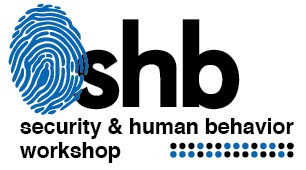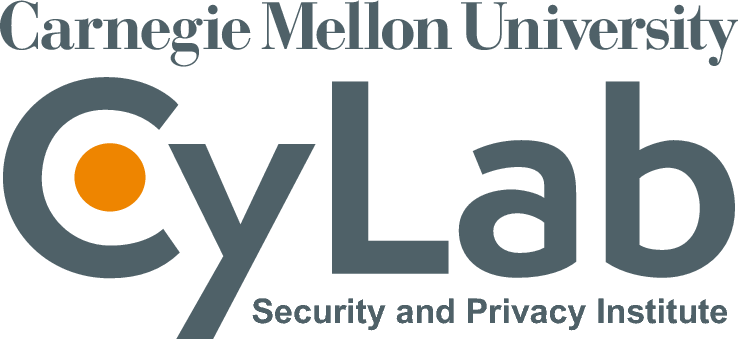|
|
May 23-25, 2018 |
PARTICIPANT LIST
Yasemin Acar, Leibniz University Hannover
You Are Not Your Developer, Either: A Research Agenda for Usable Security and Privacy Research Beyond End Users
Comparing the Usability of Cryptographic APIs
You Get Where You're Looking For
Alessandro Acquisti, Carnegie Mellon University
Privacy and human behavior in the age of information
The Economics of Privacy
Andrew Adams, Centre for Business Information Ethics, Meiji University
Facebook Code: Social Network Sites Platform Affordances and Privacy
Ross Anderson, University of Cambridge
When Lying Feels the Right Thing to Do
The Emotional and Financial Impact of Internet Fraud
Experimental Measurement of Attitudes Regarding Cybercrime
Robert Axelrod, University of Michigan
How to De-Escalate a Cyber Conflict
Zinaida Benenson , University of Erlangen-Nuremberg
Security Lifetime Labels - Overcoming Information Asymmetry in Security of IoT Consumer Products
Unpacking Spear Phishing Susceptibility
Maybe Poor Johnny Really Cannot Encrypt - The Case for a Complexity Theory for Usable Security
Laura Brandimarte, University of Arizona
Would a Privacy Fundamentalist Sell Their DNA for $1000. If Nothing Bad Happened Thereafter?
Beyond the Turk: Alternative platforms for crowdsourcing behavioral research
Jean Camp, Indiana University
Instrumenting Simple Risk Communication for Safer Browsing
Nicolas Christin, Carnegie Mellon University
Self-Confidence Trumps Knowledge: A Cross-Cultural Study of Security Behavior
Richard Clayton, University of Cambridge
Lorrie Cranor, Carnegie Mellon University
Let's go in for a closer look: Observing passwords in their natural habitat
Jayati Dev, Indiana University
Roger Dingledine, Tor Project
Anonymity Loves Company: Usability and the Network Effect
Julie Downs, Carnegie Mellon University
Serge Egelman, University of California, Berkeley
Android Permissions Remystified
Scaling the Security Wall
Is Our Children's Apps learning?
Alisa Frik, UC Berkeley
Benjamin Friedman, Visiting Fellow at Ohio State, Fellow at Defense Priorities
Vaibhav Garg, Comcast Cable
The Smuggling Theory Approach to Organized Digital Crime
Coty Gonzalez, Carnegie Mellon University
Human Decisions on Targeted and Non-Targeted Adversarial Samples
Rachel Greenstadt, Drexel University
Li Jiang, Carnegie Mellon University
Richard John, University of Southern California
Jurors' Presumption of Innocence
Michael Kenney, University of Pittsburgh
Structure and Performance in a Violent Extremist Network: The Small World Solution
Sara Kiesler, Carnegie Mellon University
Lauren Kilgour, Cornell University
Eliot Lear, Cisco Systems
Manufacturer Usage Description Specification
Yi-Shan Lee, University of Zurich
Rutger Leukfeldt, Netherlands Institute for the Study of Crime and Law Enforcement
Cybercriminal networks, social ties and online forums: Social ties versus digital ties within phishing and malware networks
Applying routine activity theory to cybercrime. A theoretical and empirical analysis
Karen Levy, Cornell University
Intimate Surveillance
A Stalker's Paradise: How Intimate Partner Abusers Exploit Technology
George Loewenstein, Carnegie Mellon University
Rutger Leukfeldt, Netherlands Institute for the Study of Crime and Law Enforcement
Jorge Guajard Merchan, Robert Bosch LLC
Tamar Mitts, University of Michigan
John Mueller, Ohio State University and Cato Institute
Misoverestimating ISIS
The curse of the Black Swan
How Safe Are We? Asking the Right Questions about Terrorism
Christof Paar, Ruhr-Universitšt Bochum
Hardware Reverse Engineering: Overview and Open Challenges
Elissa Redmiles, University of Maryland, PhD Student
Examining the Demand for Spam: Who Clicks?
Where is the digital divide? A survey of security, privacy, and socioeconomics
Nikol Rummel, Ruhr-University Bochum
Marc Sageman, Foreign Policy Research Institute
Bruce Schneier, Harvard Law School
The Battle for Power on the Internet
You Have No Control Over Security on the Feudal Internet
Our Security Models Will Never Work-No Matter What We Do
David Sidi, University of Arizona
David Livingstone Smith, University of New England
Why we love tyrants: Psychoanalysis explains how authoritarians energise hatred, self-pity and delusion while promising heaven on Earth
Ashkan Soltani, independent researcher and technologist
Initiative 17-0039 (Amdt. #1)
California Consumer Privacy Act
Frank Stajano, University of Cambridge
Pico in the Wild: Replacing Passwords, One Site at a Time
Understanding scam victims
Milind Tambe, University of Southern California
Sophie Van der Zee, Vrije Universiteit Amsterdam
The dimensions of deception detection: Self-reported deception cue use is underpinned by two broad factors
The human factor in cybercrime and cybersecurity
When Lying Feels the Right Thing to Do
Anthony Vance, Brigham Young University
What do we really know about how habituation to warnings occurs over time?
Marie Vasek, University of New Mexico
Logan Warberg, Carnegie Mellon University
Rick Wash, Michigan State University
Human Interdependencies in Security Systems
Can People Self-Report Security Accurately?
Henry Willis, RAND Corporation
Do Significant Terrorist Attacks Increase the Risk of Further Attacks? Initial Observations from a Statistical Analysis of Terrorist Attacks in the United States and Europe from 1970 to 2013
Lydia Wilson, University of Oxford
Understanding the Appeal of ISIS
Jeff Yan, Lancaster University
"To Bluff like a Man or Fold like a Girl?" - Gender Biased Deceptive Behavior in Online Poker




